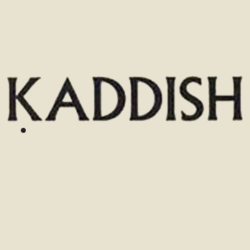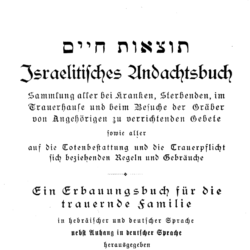| Source (Aramaic) | Translation (English) |
|---|---|
יִתְגַּדַּל וְיִתְקַדַּשׁ שְׁמֵהּ רַבָּא. בְּעָלְמָא דִּי בְרָא כִרְעוּתֵהּ וְיַמְלִיךְ מַלְכוּתֵהּ, (וְיַצְמַח פֻּרְקָנֵהּ וִיקָרֵב מְשִׁיחֵהּ.) בְּחַיֵּיכוֺן וּבְיוֹמֵיכוֹן וּבְחַיֵּי דְכָל בֵּית יִשְׂרָאֵל, בַּעֲגָלָא וּבִזְמַן קָרִיב. וְאִמְרוּ אָמֵן׃ |
I pray – that the power residing in God’s Great Name be increased and made sacred, in this world which God created freely in order to preside in it, (and increase its freeing power and bring about the messianic era.) May this happen during your lifetime our lifetimes, and those of all the house of Israel. Make this happen soon, without delay. We express our agreement and hope by saying *AMEN* |
יְהֵא שְׁמֵהּ רַבָּא מְבָרַךְ לְעָלַם וּלְעָלְמֵי עָלְמַיָּא: |
“May that immense power residing in God’s great name flow freely into our world and worlds beyond.” |
יִתְבָּרַךְ, וְיִשְׁתַּבַּח, וְיִתְפָּאֵר, וְיִתְרוֹמֵם, וְיִתְנַשּׂא, וְיִתְהַדָּר, וְיִתְעַלֶּה, וְיִתְהַלָּל, שְׁמֵהּ דְקֻדְשָׁא בְּרִיךְ הוּא. לְעֵלָּא מִן כָּל בִּרְכָתָא וְשִׁירָתָא, תֻּשְׁבְּחָתָא וְנֶחֱמָתָא, דַּאֲמִירָן בְּעָלְמָא, וְאִמְרוּ אָמֵן׃ |
May that Great Name, that sacred energy, be shaped and make effective and be acknowledged and be given the right honor and be seen as beautiful and elevating and bring jubilation. Way beyond our input of worshipful song and praise, which we express in this world, As we confirm our agreement and hope by saying *AMEN*. |
יְהֵא שְׁלָמָה רַבָּא מִן שְׁמַיָּא וְחַיִּים טוֹבִים וְעַל כָּל יִשְֹרָאֵל, וְאִמְרוּ אָמֵן׃ |
May that endless peace that heaven can release for us bring about the good life for us and for all Israel As we express our agreement and hope by saying: *AMEN*. |
עוֹשֶׂה שָׁלוֹם בִּמְרוֹמָיו הוּא יַעֲשֶׂה בְּרַחֲמָיו שָׁלוֹם עָלֵינוּ וְעַל כָּל יִשְׂרָאֵל וְעַל כָּל יוֺשְׁבֵי תֵבֶל |
You, who harmonize it all on the highest planes – bring harmony and peace to us, to all Israel and all sentient beings |
וְאִמְרוּ אָמֵן׃ |
As we express our agreement and hope by saying: *AMEN* |

“קדיש יתום | Mourner’s Ḳaddish, interpretive translation by Rabbi Zalman Schachter-Shalomi” is shared through the Open Siddur Project with a Creative Commons Attribution-ShareAlike 4.0 International copyleft license.





At her website, writer Sarah McCulloch adds her own adaptation of the Kaddish inspired from Reb Zalman’s Kaddish:
Mourners Kaddish: A Creative Translation
by Rabbi David Zaslow
Highest and Holiest is the incredible Name of God’s Unity. Amen.
The Unity of body, heart, mind, and soul that exists in our world
and which is continually created and made available by Divine will.
May the awareness of God’s unity quickly become apparent
in our lifetime, and in our days,
and in the lifetime of all those who struggle with Reality.
May God’s great Name of Interdependence
be blessed forever: in all ways, in all days.
Blessed, praised, glorified, exalted, uplifted,
adorned, held high, and hailed is the Name of the Holy One, Blessed Be.
The Holy One, the Only One, God, our God Who is at the same time
beyond all blessings, songs, prayers, and comforting words
which we can possibly speak in this dimension.
And let us say, Amen.
May there be an incredible sense of wholeness,
completion, peace, and life for us and for all those who wrestle with Reality.
And let us say, Amen.
Thank you so much for sharing your translation Rabbi Zaslow. We’ve posted it separately set side-by-side with the Aramaic sourcetext, here.
[…] Make this happen soon, without delay. We express our agreement and hope by saying *AMEN* … Full text here – Zalman Schachter-Shalomi Creative Commons Attribution-ShareAlike 4.0 Int’l license. […]
[…] an alternative translation that you can read below, taking inspiration from Reb Zalman’s alternative version. A copy of the sheet that I used with the transliteration, my translation and a traditional […]
Tonight begins the seventh day of Pesach. It’s a yontif (Yom tov, a non-work holiday day), like the first day (or two) of Passover, and I invite you to light candles to mark the beginning of this ending. Such markers of time are especially important for those of us whose days are blending into each other as we stay home and struggle to create structure for ourselves. Notice the last day of Passover.
And then, on Wednesday night for those who celebrate 7 days of Pesach, and Thursday for those who celebrate 8, it’s eat chametz night! Time for pasta and toast, bagels and bread, cereal and — who knows? — doughnuts. Enough with the bread of affliction already.
And if you are a Jew whose roots are in North Africa, you already know about Mimuna (Maimouna), a joyous community-wide celebration of the return to chometz-dikeh eating. (OK. that’s a little too cross-cultural — an Ashkenazi pronunciation for a Sephardi celebration.) One of my college professors, Dr. Joelle Bahloul, grew up in Morocco and from her I learned of the close collaboration between Jewish and Muslim neighbors in the celebration of Mimuna. After all, how could you throw a party full of chametz (leavened/fermented food) starting immediately after sunset when you have had nary a crumb nor drop of it in your house for the past 8 days? Only if your neighbors had ready for you to purchase, borrow, or “buy back” all that you would need!
Joyful Maimuna follows the last day of Pesach. But the last day itself, whether 7th or 8th, is a solemn one. It is one of four days on the Jewish calendar designated for Yizkor, the memorial service whose centerpiece is a prayer asking “May God remember” people who have died. It concludes with El Maley Rachamim, a prayer asking “God, full of compassion” to shelter the souls of the departed beneath the wings of God’s presence, and then Kaddish.
This year, we have need for pausing and remembering at Yizkor. It’s not that God needs a reminder. We do.
Yizkor is recited on days which traditionally would bring family to mind, Yom Kippur and the three major agricultural festivals: Pesach/Passover, Shavu/ot/“Weeks,” and Sukkot/“Booths.” (Technically on Shmini Atseret, the holiday at the end of Sukkot.) Here, at the end of Pesach 5780, family is very much on our minds, whether we have it or not. Family with whom we are hunkered down at home, and family we can only see on a screen and speak to through the ether. Family we will never see again in this world, and family who aren’t there to care for us if we get sick.
Originally, Yizkor was recited only on Yom Kippur. Its primary purpose was to honor the deceased by committing to giving tzedakah [charity] in their memory, on the theory that the good deeds of the survivors elevate the souls of the departed. It also enhanced the chances for personal atonement by doing a deed of lovingkindness. Since the Torah reading on the last day of the pilgrimage festivals [the holidays of Sukkot, Passover, and Shavuot] mentions the importance of donations, Yizkor was added to these holiday services as well.
It was the custom in medieval Germany for each community to read a list of its martyrs at the Yizkor service. The practice was eventually expanded to include the names of other members of the community who had died. (MyJewishLearning.com)
We have many names to recite this year … and cannot. As of this writing, the World Health Organization reports that 117,217 people have died worldwide from the novel coronavirus that causes COVID-19. We know that this number is too low to accurately represent reality. There will never be a complete accounting, and most names are unknown to anyone but the people who love them and the people who held their hands, if they could, as they died. And, if so you believe, to God.
But our people have known mass death before. There is a version of El Maley Rachamim for Jews who died in the Shoah (otherwise known at the Holocaust). There are others as well, with the exact language changed depending on what tragedy has occurred. For instance, this 2017 El Maleh Rachamim for Victims of Racial Violence. Undoubtedly there were similar memorial prayers after the Black Death and the massacres of Jews, who accused of causing it by poisoning wells.
So this year, we might pray:
אֵל מָלֵא רַחֲמִים, שׁוֹכֵן בַּמְרוֹמִים
הַמְצֵא מְנוּחָה נְכוֹנָה תַחַת כַּנְפֵי הַשְּׁכִינָה
בְּמַעֲלוֹת קְדוֹשִׁים וּטְהוֹרִים כְּזֹהַר הָרָקִיעַ מַזְהִירִים
אֶת נִשְׁמוֹת כָּל בְּנֵי וּבְנוֹת אָדָם וְחָוָה
אֲנָשִׁים נָשִׁים וְטַף
שֶׁנִּגְעוּ בַּמַּגֵּפָה וָמֵתוּ
.מִפְּנֵי גִזְעֲנוּת וְשַׁאֲנַנוּת, בְּמִקְרֶה וּמֵמָצָבִים רְפוּאִיִים
בַּעֲבוּר שֶׁבְּלִי נֶֽדֶר
אֶתֵּן צְדָקָה בְּעַד הַזְכָּרַת נִשְׁמוֹתֵיהֶם
.בְּגַן עֵדֶן תְהִי מְנוּחָתָם
אָנָּא בַּעַל הָרַחֲמִים,
הַסְתִּירֵם בְּסֵתֶר כְּנָפֶיךָ לְעוֹלָמִים
.וּצְרוֹר בִּצְרוֹר הַחַיִּים אֶת נִשְׁמוֹתֵיהֶם
ה’ הוּא נַחַלָתָם, וְיָנוּחוּ בְשָׁלוֹם עַל מִשְׁכּבוֹתֵיֶהם. וְנֹאמַר אָמֵן
God full of compassion, dwelling on high,
grant perfect rest beneath the sheltering wings of Your Presence,
among the holy and the pure who shine with the light of the heavens,
for the souls of our brothers and sisters, all people,
men, women, and children,
who have been struck by the plague and died
because of complacency and racism, chance and underlying conditions.
I hereby commit (without making a vow)
to do acts of justice in their memory.
May the Garden of Eden be their resting place.
Oh please, God of compassion,
keep them in the shelter of Your wings for eternity
and bind up their souls in the bond of life.
The ETERNAL is their inheritance; may they rest in peace,
and let us say, Amen.
If you have a yahrzeit candle, I invite you to light it tonight or tomorrow night (depending on whether you observe 7 or 8 days of Pesach) just before you light holiday candles. Take a moment for your own meditation or a prayer, or just stand silent to honor the memories of uncounted thousands of our fellow human beings who have died in this pandemic.
!עֹשֶׂה שָׁלוֹם בִּמְרוֹמָיו, הוּא יַעֲשֶׂה שָׁלוֹם עָלֵֽינוּ וְעַל כָּל יִשְׂרָאֵל, וְעַל כָּל יוֹשְׁבֵי תֵבֵל, וְאִמְרוּ אָמֵן
Oseh shalom bimromav, hu ya’aseh shalom, aleynu ve’al kol yisra’el, ve’al kol yoshvey teyvel, ve’imru: Amen!
May the One who makes peace in the heights, make peace for us,
for all Jews everywhere,
and for all the inhabitants of the planet,
and let us say: Amen!
[…] is part of one translation. It’s an “interpretive” translation by Rabbi Zalman Shachter-Shalomi. One of my […]